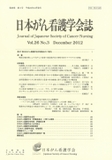Japanese
English
- 販売していません
- Abstract 文献概要
- 参考文献 Reference
要旨
本研究の目的は,混合病棟で働く看護師からみた終末期にあるがん患者と,非終末期にあるがん患者に対する認識(患者に対する印象と心理的距離感)と感情,およびそれぞれの患者に対して行った感情労働の違いを明らかにすることである.
対象は終末期患者と非終末期患者を受け持ったことがあり,終末期患者と非終末期患者が混在する病棟で勤務している臨床経験13カ月以上の女性看護師567名とし,自記式留置質問紙法にて調査を実施した.対象看護師には,過去に受け持ったことがある,あるいは現在受け持っている終末期患者と非終末期患者それぞれに対する認識と看護師の感情,および各患者に対して行った感情労働について各回答を求めた.
その結果,372名の看護師より回答が得られた.終末期患者に対する看護師の印象の「個人的親しみやすさ」が増すほど,「心理的距離感」は遠くなる傾向がみられ,非終末期患者とは逆の結果となった.このことから,看護師は終末期患者との親密な関係を築くほど,患者への死に対する思いの葛藤があることが示唆された.また,終末期患者に対して行う感情労働をみると,非終末期患者に比べ,下位項目の「感情労働総合得点」「表出抑制」および「ケアの表現」の感情労働量が有意に多かった(p<.001).このことから,終末期患者をケアする看護師は,患者の苦痛が軽減できるような気づかいと共感的態度に加え,自らの感情を抑えながら笑顔をつくりケアを提供していることが示唆された.
Abstract
The purposes of this study were to compare the difference between nurses' cognition including impressions and psychological distance from patients with end-stage cancer(ESC)and those with nonend- stage cancer(N-ESC), and to elucidate feelings and emotional labor involving these patients.
The sample was a convenience sample of nurses who provided nursing care to patients with both ESC and N-ECS cancer. A self-oriented questionnaire was delivered to 567 nurses who had 13 months or more of clinical experience. Each nurse was asked to choose two patients in the past or present, one with ESC and the other with N-ESC, and then asked to respond to questions about nurses' cognition, feelings, and emotional labor involving these patients.
A total of 372 agreed to participate in this study. The nurses' cognition about "friendliness toward their patients" and "feeling of psychological distance" was negatively correlated for the patient with ESC, and was positively correlated for the patient with N-ESC. The nurses showed emotional conflict between having an intimate relationship with the patients and feeling grief. In addition, the nurses responded that they did more "expression of caring", and "suppressed expression" of emotional labor tasks for the ESC patients than for the N-ESC patients(p<0.001). These results suggested that the nurses provided pain relief care with sympathy. In addition, the nurses tended to hide their feelings and tried to show a smile on their face when they provide care to the ESC patients.
Copyright © 2012, Japanese Society of Cancer Nursing All rights reserved.


